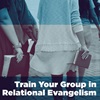I recently had the honor of attending the retirement party of the General of the National Guard for the state of North Dakota, General Michael Haugen. It was a garden party extraordinaire—large white tents set up on plush, green lawns; ice sculptures overlooking long tables filled with freshly carved meats, salads, fruits, and bread; tables covered with white linen tablecloths; and live garden party music performed by accomplished string and brass artists. The night was beautiful—clear skies, no wind, and the perfect temperature. The governor, congressmen, generals, soldiers, and friends gave speeches that brought both laughter and tears to the audience of hundreds. Finally, it was time for General Haugen to say a few words. He was moved by the love expressed by all in attendance. He began to thank the governor for his support when a low thunderous rumble began to play in the background. He continued to speak, just a little louder. The noise grew until it upstaged the General and he had to put the microphone down. Everyone turned to see the approach of, not one, but a hundred motorcycles. Driving slowly in pairs, carrying large American flags, men and women wearing denim and leather paraded past the General and his wife. These bikers are vets and families and friends of soldiers previously and currently deployed. Many of them wear a button with the photo of the son of a couple who was killed in Iraq. These men and women have become known in the state of North Dakota as the Freedom Riders. In the past year, they have attended every funeral of a North Dakota soldier killed in Iraq and Afghanistan. Their mission is to protect the families of the deceased soldier and uphold the honor of his or her funeral. When protesters try to disrupt these funerals, the Freedom Riders circle the funeral with their bikes and hold up large American flags to prevent them from seeing what is going on. If the protesters try to shout their disapproval, the Freedom Riders clap to drown out their hurtful remarks.
The audience stood and applauded for over fifteen minutes while each biker passed and then parked. The leader of the pack of motorcyclists embraced the General and presented him with a plaque as a symbol of their appreciation for all he had done. The General invited every one of the bikers into the garden. Food was replenished, and the large trough with ice was suddenly filled to the brim with cold drinks. In a moment, a garden party for invited quests only became a banquet for all who believe in honor.
During the Bible study portion of your small group meeting, take the time to consider all who believe in Jesus. Those who sit in your small group may live a similar lifestyle, dress in clothes from the same stores, hold jobs that are equally secure and profitable, and think comparable thoughts. But, then again, maybe not. Maybe one or more of your group members dresses differently and often has thoughts that challenge your way of thinking. Maybe they are unemployed or have admitted to having an affair. Maybe they struggle with homosexuality or anger. If they believe in the saving power of the resurrected Christ, are they not also invited to the Banquet?
Take the time to apply the Scripture to all. Simply add two questions to every lesson:
- What does the Word we have been studying tonight mean in my life?
- What does it mean in the life of _________________? (Ask your group members to fill in the blank: "My brother who struggles with homosexuality" "My neighbor who is always yelling at my kids" "My friend who does not believe in God")
Taking the time to consider the impact of God's Word in the lives of those around us will give us a clearer picture of the Banquet awaiting us in heaven. It will also help us reach out to others with the invitation—God's saving love.









